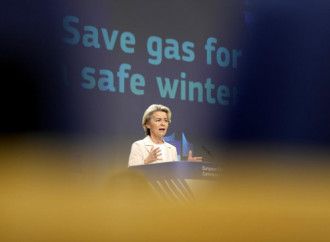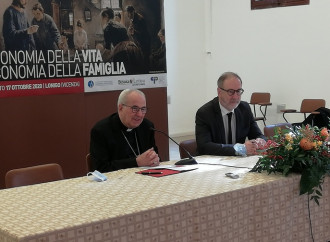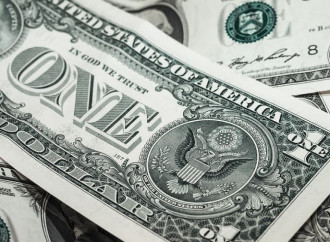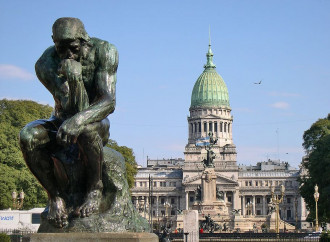Google anti-trust trial decides Web’s future
Google is on trial for the first time in its history. The Web giant is accused of abusing its dominant position, accounting for 90% of online searches. The American judiciary aims to prove that it has violated anti-monopoly rules. The future of the Web depends on it.
Farage saga exposes banks’ attack on free thought
The closure of Nigel Farage's bank account for his political ideas is a signal to target a politically exposed figure. But it is only the beginning: the banks are gradually encompassing the standards effect of the 2030 Agenda.
Europe asks us to ration our gas. The (un)happy degrowth is here
Reducing gas demand by 15% from 1 August 2022 to 31 March 2023, with possible exceptions of 7% cuts up to exemption. After the imposition of sanctions on Russia and the reduction of the gas flow from the East, Europe is moving towards “energy degrowth in solidarity”, especially towards Germany, which suffers most from the Russian gas cut. Member states must update their energy plans and report to the Commission every two months. Meanwhile, we will be more dependent on liquefied gas from the US. As well as on solar panels produced in China. The environmentalists of Fridays for Future are not satisfied with this and are threatening all-out occupation of schools, to “end the fossil economy internationally”.
Air chaos, travellers grounded to the delight of the Greens
In these summer days if you happen to miss a trip because your flight is cancelled, if your luggage is lost at the airport, if your departure is hours late, you are not alone. The phenomenon is worldwide. And the cause is also political: environmentalism that is 'ashamed' of air travel and is beginning to translate into policies against airlines.
Two ways to avoid a global food crisis
The first measure to control global food prices is to put some of the accumulated stocks on the market. But then structural interventions are needed to increase production: the EU has taken the opposite route, focusing on organic farming, therefore developing countries have to go it alone. The negative consequences of Laudato si' and the positive role the Church could play instead.
There’s more to the Wheat crisis than just the Russian-Ukrainian war
To understand the current international apprehension over the wheat stocks blocked in Odessa, one needs to know that together Russia and Ukraine produce 14% of the world's wheat. But the steep rise in the prices of agricultural products began well before the conflict in Eastern Europe, due to the rush to stockpile by some countries after the pandemic and the forecasts of a decrease in world production.
The central banks have succeeded. Inflation is back
By injecting huge amounts of liquidity created out of thin air into the economy, inflation has exploded. It’s the "medicine" the central banks are dishing out to reduce the real value of uncontrolled debts. The bill will be paid by the middle and lower middle classes, from small savers to the holders of fixed incomes: wages, salaries and pensions. And "financial socialism" takes another step forward.
Statism, globalism, ecologism: ideologies that destroy people
Catholic Social Doctrine is a veritable antidote to the ideologies currently dominating economic policies. This is also true in terms of how the Covid pandemic has been handled, giving rise to both a new form of centralised government and an "open society". It is true also in terms of the ecological movement, which has now become a new religion and the cause of injustices harming the poor. It also holds true for economic "degrowth" which smacks of dangerous utopian ideals and reminiscent of centuries-old heresies involving pauperism. Finally, Catholic Social Doctrine is an antidote to globalism, a distortion of true fraternity. Below, we publish some the main points from Archbishop Giampaolo Crepaldi's talk given at the third annual Catholic Social Doctrine conference in Lonigo (Northern Italy).
Inflation, a hidden tax and no help to any crisis
Those who live on fixed incomes - wages, salaries, pensions – during times of high inflation, see their purchasing power erode over time. And yet the central banks, starting with the United States Federal Reserve, are definitely aiming at inflationary models, believing that they can help the state and companies overcome crisis by devaluing their debts. Unfortunately this is a tragic illusion and we will pay dearly for it.
Let's cry for Argentina. One default after another, a lesson for populists
Argentina has run the risk of its ninth default, which was avoided at the last minute only by an agreement with creditors. There remains the grave problem of the credibility and holding of public accounts. It is a lesson for Italy: we are not all that different. The Daily Compass speaks with economist Michele Boldrin
Printing money kills enterprise
Monetary expansion distorts entrepreneurial competitiveness because it concedes enormous power to companies that have easier access to liquidity. This is why entrepreneurs tend to disappear and why companies in the hands of finance tend to multiply.
Expansive monetary policies kill savings and responsibility
For years, it seems that the only way to resolve economic crises is by central banks issuing new liquidity. However, this continuous creation of money “out of thin air” has negative ethical implications. It damages individuals and social cooperation.











